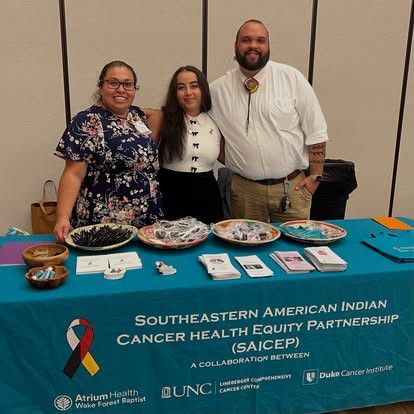St. Jude Family of Websites
Explore our cutting edge research, world-class patient care, career opportunities and more.
St. Jude Children's Research Hospital Home

- Fundraising
St. Jude Family of Websites
Explore our cutting edge research, world-class patient care, career opportunities and more.
St. Jude Children's Research Hospital Home

- Fundraising
Strength in Community: Native Youth Leading HPV Cancer Prevention
October 2025
By Ryan Dial (Lumbee), MCLS, MLS(ASCP)cm
North Carolina is home to the largest American Indian population on the East Coast, with eight sovereign Tribal Nations and four Urban Indian Organizations. Despite this strong presence, Native people in North Carolina continue to face persistent health disparities, largely driven by adverse social determinants of health, compared to the state’s non-Hispanic white populations. At the same time, tribal communities have demonstrated remarkable strength, resiliency, and a commitment to protecting the health of future generations.

Recognizing these realities, in the spring of 2021, the Associate Directors of the Community Outreach and Engagement programs from North Carolina’s three NCI-Designated Comprehensive Cancer Centers at Atrium Health Wake Forest Baptist Comprehensive Cancer Center, the Duke Cancer Institute, and University of North Carolina Lineberger Comprehensive Cancer Center, came together to address cancer health disparities among Native communities in their collective catchment areas. This collaboration led to the formation of the Southeastern American Indian Cancer Health Equity Partnership (SAICEP), with a mission to reduce cancer burdens by uniting the expertise of cancer centers with the cultural knowledge and priorities of our Native communities. SAICEP’s mission is carried out through culturally tailored health education, equitable research, and sustainable engagement across tribal nations and urban Indian communities.
Since its founding, the SAICEP team has attended more than 45 community events, built partnerships across the state, and created a Community Advisory Board of nine leaders who represent diverse tribal communities and perspectives across the cancer care continuum. With these partnerships, the SAICEP team along with the North Carolina Commission of Indian Affairs led the largest data collection of Native peoples in NC to understand both ceremonial and commercial tobacco use among our people.
This year marks SAICEP’s fourth year of funding from the V Foundation, which supports the partnership’s efforts to understand and address cancer disparities. With this round of funding, SAICEP is focusing specifically on cancer risk factors among Native youth and young adults, including commercial tobacco use, sun exposure, and HPV vaccination. As of 2024, the most recent year data is available for, the rate of North Carolina adolescents ages 13–17 who are up-to-date on the HPV vaccine is 66.8%. However, the data do not include American Indian youth specifically, grouping them instead into an “Other or Multiple Races” category. The U.S. Department of Health and Human Services’ Office of Minority Health also reports that no HPV vaccination data are available for American Indian women ages 19–26. This lack of data is concerning, as American Indian people face higher incidence and mortality from HPV cancers compared to non-Hispanic whites.

SAICEP engaging attendees at an outreach event.
To begin closing these gaps, SAICEP is launching its first Native Youth Cancer Health Ambassador Program. Over the next year, youth across North Carolina will be trained to serve as advocates for cancer prevention in their communities. Ambassadors will receive culturally grounded cancer education, learn evidence-based strategies for risk reduction, and share knowledge with their peers, families, and tribal networks. The program will emphasize three key areas: HPV vaccination as a powerful tool for cancer prevention, commercial tobacco and e-cigarette reduction, and sun safety and skin cancer prevention. By empowering youth to lead, SAICEP aims to build sustainable change from within communities. Youth voices are uniquely positioned to influence peers, encourage open conversations about health, and model healthy behaviors for the next generation.
Native peoples are one of the many strengths of North Carolina, and their resilience is a foundation for building healthier futures. SAICEP’s work is not just about addressing disparities, it is about creating sustainable systems of collaboration that honor tribal sovereignty and community priorities. The road ahead is long, but through partnerships, data equity, and youth leadership, SAICEP is committed to reducing the burden of cancer in Native communities. By investing in prevention strategies like HPV vaccination today, we can ensure a healthier future for Native youth across North Carolina.
Learn more about HPV cancer prevention among American Indian and Alaska Native communities here.
About the author
Ryan Dial is an enrolled citizen of the Lumbee Tribe of North Carolina and lives in Durham with his wife, Idalis Jacobs Dial. He serves as the American Indian Health Program Manager at the University of North Carolina (UNC) at Chapel Hill, leading initiatives through the UNC Lineberger Comprehensive Cancer Center and the UNC American Indian Center. Ryan is also adjunct instructor in American Studies, where he developed and teaches UNC’s first undergraduate course on American Indian health. As a DrPH student at Johns Hopkins University, his work focuses on advancing Indigenous health equity through culturally grounded programming, research, and community-driven solutions.
